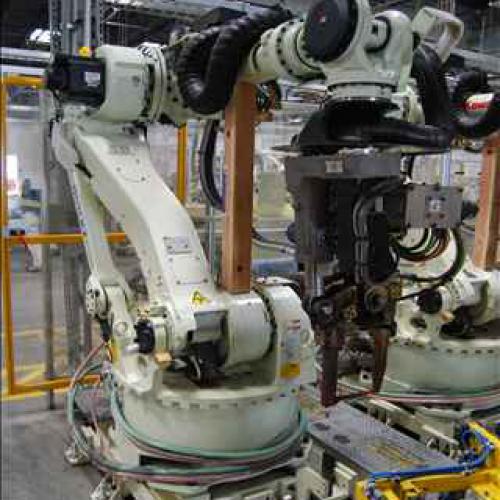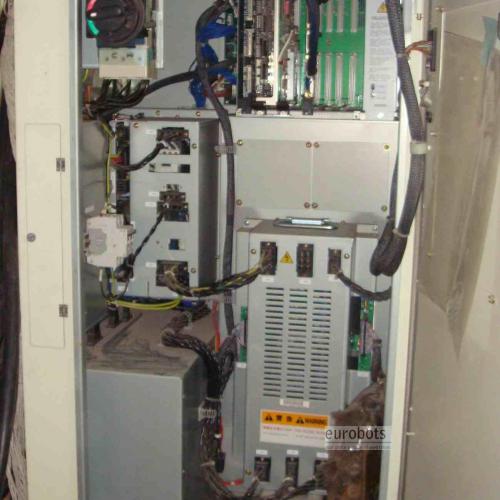川崎 ZX165U control D
Years 2006-2007. The Z Series (6-axis) heavy-duty robot was developed using Kawasaki’s advanced technology and extensive experience in automation. The robust low-maintenance designs suit numerous industrial applications and are directly responsible for improved production line efficiencies in automotive and general industry application.
Typical Applications:
Assembly, Dispensing, Fabrication, Machine Tending, Material Handling, Material Removal, Press Tending, Sealing, Spot Welding
D CONTROLLER SPECIFICATIONS
Ergonomic operation
The Teach Pendant (TP) is a combination of control keyboard and an easy-read, 6.4 inch colour LCD touch- screen. A new hardware structure for the TP reduces the key response time and the ergonomic arrangement of the keys helps the operator achieve optimised inputs and programming. The workflow is optimised and the TP becomes an ergonomic user platform for operating the robot Special software combined with standards Application Software Modules facilitate programming for a wide range of applications such as palletising, handling, spot welding, gluing and arc welding. The simplified block programming and Kawasaki‘s high level robot language (AS-language) provides enormous possibilities for innovative movement- and process control. Using the available options – such as servo-welding, network support and a high-performance visualisation system – a platform is created to find flexible solutions for even the most complex of applications.
High performance through modern control technology
A RISC, 64-bit high-speed dual processor provides the computing power. The use of a fully digitally controlled servo-system has significantly improved operating performance, cycle time and path accuracy. The controller is of course fully downwardly compatible. This means that the D controller can be integrated in existing old systems with no problems.
Control design
• Connection of peripheral equipment
Standard I/O connections and a number of field bus interfaces such as Interbus, Profibus, CC-Link and DeviceNet etc. are available as interfaces to the peripheral equipment. The peripheral equipment is connected directly and permits the system‘s high flexibility. Furthermore, K-Logic (integrated software PLC) allows the creation of a highly complex Integrated system at a minimum cost.
• Network communication
The controller also supports network communication via Ethernet to communicate with a host computer and for an easy upload and download of the programs to be run. Furthermore, the status of the robot can be monitored per remote access via an Intranet/Internet connection.
• Extension with additional axes
A further two axes can be integrated in the standard controller without any problems and without an additional housing. Three or more additional axes are available by selecting SSCNET-compatible motors. This allows multi-axial systems to be easily configured to match the customer‘s requirements.
• User-friendly design
A reduction of the controller‘s internal wiring and the use of modular assemblies facilitates servicing and ensures shorter working times when repairing or replacing parts with no long and costly downtimes. What‘s more, supporting service functions such as data storage help the user locate the causes of existing problems.
Robot Info
- Maximum Load of Robot: 165 Kg
- Maximum horizontal reach: 2651 mm
- Repeatability: 0,3 mm
- Controller: D
Robot Motion Speed
- Axis 1: 110º/s
- Axis 2: 110º/s
- Axis 3: 110º/s
- Axis 4: 135º/s
- Axis 5: 135º/s
- Axis 6: 210º/s
Maximum stroke
- Axis 1: +-180º
- Axis 2: +75º -60º
- Axis 3: +250º -120º
- Axis 4: +-360º
- Axis 5: +-130º
- Axis 6: +-360º
アプリケーション
スポット溶接 , プレステンディング , パレタイズ , 部品のロードとアンロード , 機械加工 , 部品の取り扱い , Laser cutting , Laser welding Nd-Yag , 接着-接着剤による接着 , Stud welding , プラズマ切断
写真
ビデオ
設計図

 English
English
 Spain
Spain
 Germany
Germany
 France
France
 Russia
Russia
 China
China
 Argentina
Argentina
 Portugal
Portugal
 Colombia
Colombia
 Italy
Italy
 India
India
 Brazil
Brazil
 Japan
Japan
 Mexico
Mexico
 Turkey
Turkey
 Ukraine
Ukraine
 Peru
Peru
 Sth. Africa
Sth. Africa




